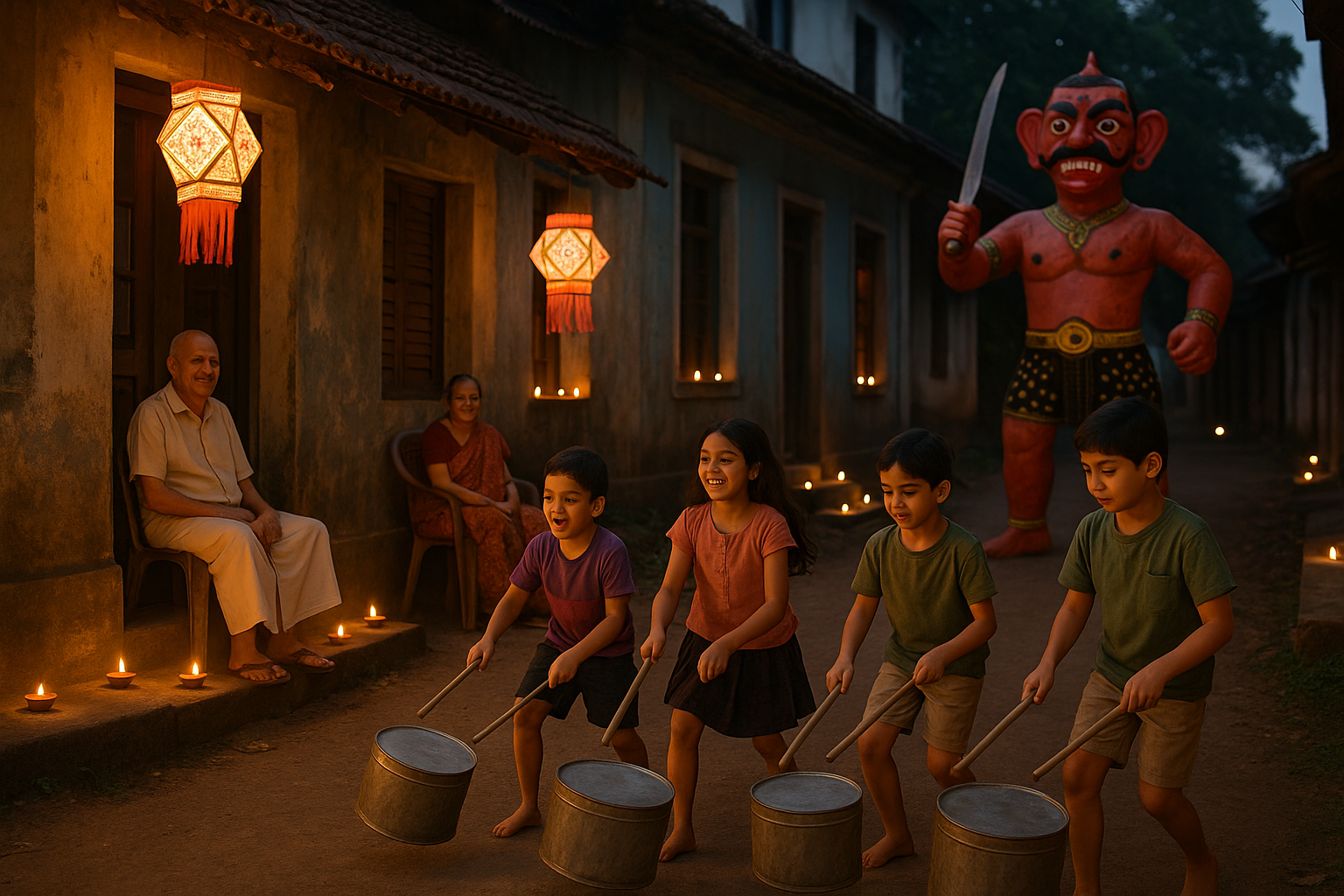
PANAJI
Diwali is here — a time when many Goans relive memories of the past. The aroma of freshly made snacks mixed with the smell of ‘Maraan’, while the sounds of children shouting “Ghan che katar ghan, ghan ghan ghan, ghan che katar ghan” echoed through the streets. Children beat tin boxes with bamboo sticks, going door to door on the eve of Narak Chaturdashi. The air carried the mixed scents of polished furniture, freshly painted walls, and burning earthen pantis on the verandahs.
These were the signs of Diwali in the old days — a festival filled with warmth and togetherness. Families exchanged plates of homemade sweets and snacks with neighbours, and anyone who came to the doorstep was offered food. Every emotion came straight from the heart — simple, genuine, and pure.
Times have changed. Today’s Diwali feels more polished and commercial. People wear branded ethnic clothes, exchange expensive gifts and sugar-free sweets, and send e-greetings. The tradition of making snacks at home has faded, replaced by store-bought flavours. The childhood excitement of breaking piggy banks to buy fatakas (firecrackers) or searching through the ashes for unburnt ones is missing. Now, firecrackers are banned for environmental reasons.
The handmade akashdivo (lanterns) that families once spent afternoons creating have been replaced by ready-made Chinese lanterns that last for years. Even the burning of Narkasur has changed — the effigies have become massive and less personal. Gone are the days when everyone knew who was inside the Narkasur costume dancing around the lanes, collecting coins in empty tins. The tiny, blue-bodied Krishna with a cardboard sword playfully fighting evil is now just a memory.
Today’s Narkasurs are built for competitions that offer big cash prizes. Ironically, the ugliest and most horrifying effigies often win. The cheerful sound of children banging tin boxes has been replaced by loud music, traffic jams, and blaring sound systems. Amid all this noise, the true spirit of Diwali — celebrating the victory of good over evil — seems to be fading away.
Many groups now take part in Narkasur competitions every year, supported by sponsors and organisations with political backing. The original meaning of the event has been lost in commercialisation. There are hardly any ‘Krishnas’ left to accompany these oversized effigies, and when they do appear, they’re overshadowed by the gigantic demons beside them.
A walk through the Panaji market shows stalls selling masks, bamboo, and paper for making Narkasurs, as well as smaller ready-made versions. The mini Narkasurs — some with wide smiles and firecrackers in hand — are in high demand. A medium mask costs around Rs 550, while larger ones range from Rs 850 to Rs 900. Some extra-large masks with fierce expressions are even costlier.
Young people building Narkasurs worry that untimely rain could spoil their work, as it did last year. One youth from Taleigao recalled how their effigy collapsed when the rain soaked the paper decorations, leaving only the bamboo frame. “This year we’ve used iron rods for a stronger structure and covered each part in plastic so that rain won’t ruin it,” he said. With the weather forecast predicting rain in the coming days, many teams have covered or sheltered their Narkasurs.
In Vasco, the Murgaocha Raja Welfare Trust at Sada will hold a State-level Narkasur Vadh competition on October 19 at 5 pm, offering prizes of Rs 1,00,000, Rs 70,000, and Rs 50,000, along with five consolation prizes of Rs 10,000 each. The Mashem Cricket Club will hold its contest later that night at Shree Nirakar ground, with prizes of Rs 30,000, Rs 25,000, and Rs 20,000, and three consolation prizes. There’s also a ‘Piken Narkasur’ contest for children under 15, featuring effigies between 4 and 8 feet tall.
The State government has banned all programmes after midnight and restricted the use of loud music. Organisers have been told not to block roads or disturb traffic, and violators will face penalties. Police have issued guidelines to teams in Panaji, Agassaim, and Old Goa to ensure rules are followed.
Despite the changes, Diwali will always bring its unique joy. It remains a time to light lamps not just outside our homes, but within our hearts — to defeat the darkness within and spread peace, happiness, and goodwill across Goa.